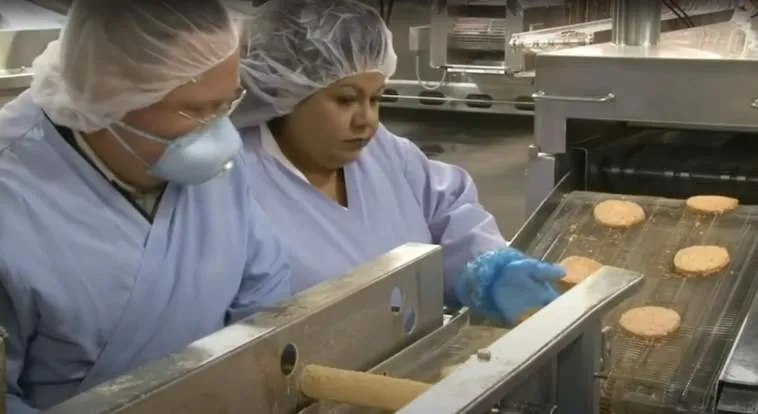(National Pulse) Lab-grown meat, touted as the “cruelty-free” food of the future by everyone from the World Economic Forum to Hollywood mega-celebs like Leonardo DiCaprio, may have a fatal problem, according to a new Bloomberg story.
The problem is that the materials used to make the product – “immortalized cell lines” – replicate forever, just like cancer. Which means, in effect, that they are cancer. Although these cell lines are widely used in scientific research, they’ve never been used to produce food before.

Industry types are “confident” that eating such products poses no risk – although there isn’t any hard data – but it’s not difficult to see, even if the products are “proven” safe, how people might be put off by the thought they’re eating a glorified tumor.
All the evidence suggests that the most prominent producers of these new products – including the “Big Three” startups, Believer Meat, Eat Just and Upside Foods – are doing their best to avoid confronting the issue in public. But whether they’ll be able to keep do so after this latest blast of high-profile negative publicity, remains to be seen.
The story comes at a time of growing difficulty for new alternatives to traditional animal products, especially so-called “plant-based meats”.
At the beginning of the month, we reported on the ongoing problems faced by Impossible Foods, which is laying off 20 percent of its workforce, or nearly 140 staff.
Plant-based meats have gone from double-digit growth to double-digit decline in the last year, with sales of refrigerated meat alternatives falling by 10.5 percent for the year to September 4 2022.
In response to another cover story from Bloomberg Businessweek, which labelled plant-based meats “just another fad”, Impossible took the bold step of taking out a full-page advertisement in the New York Times to counter the claims. Impossible’s new CEO, Peter McGuiness has put the company in a more confrontational stance, which includes denying the mounting evidence that his company, and others like it, are in serious trouble.
Beyond Meat, by contrast, has barely even been able to put on a brave face. Shares in the company plunged 75 percent in the first three quarters of the last year, and its flagship pilot collaboration with McDonald’s, the “McPlant Burger”, was discontinued by the fast-food giant.
LAB-GROWN MEAT: HYPE AND REALITY.
Massive amounts of money have already been raised by companies in the lab-grown meat segment of the alternative-foods industry. Believer Meat, Eat Just and Upside Foods – the “Big Three” – have raised $1.2 billion between in venture funding, in the hope that one day very soon their products will be sold in stores.
These new companies have the backing of organizations like the World Economic Forum, which has proposed a “Planetary Health Diet” built around plant-based and alternative protein sources. Activist celebrities are also providing very public support, as well as financing, for the new technology. In 2021, for instance, Leonardo DiCaprio bought an unspecified stake in two lab-grown meat companies, Mosa Meat and Aleph Farms, after an earlier investment in Beyond Meat.
In a press release to accompany his more recent investment, DiCaprio said, “One of the most impactful ways to combat the climate crisis is to transform our food system. Mosa Meat and Aleph Farms offer new ways to satisfy the world’s demand for beef, while solving some of the most pressing issues of current industrial beef production.”
At the end of last year, Upside passed a significant milestone for lab-grown meats when it became the first manufacturer to receive the necessary pre-approval from the FDA to bring its products to market.
Despite the apparently rosy outlook, however, it’s clear that there are potentially significant problems facing lab-grown meat products as they draw nearer to being available for general sale.
Companies like Upside and the other Big Three like to stress that their products actually are meat, and choose a variety of names such as “cultured meat” or “cell-cultured meat” to describe them. But the truth is, their products differ from typical animal cells in that they will replicate eternally if placed under the right conditions, just like cancer. This brings with it safety but also image concerns.

While “prominent cancer researchers” reassured Bloomberg that, “because the cells aren’t human, it’s essentially impossible for people who eat them to get cancer from them”, or for the cells to go on replicating inside a human body, the truth is that there are no long-term safety data for consumption of “meat” produced from immortalized cell lines.
The first immortalized human cell line was produced from cancer cells taken from Henrietta Lacks in 1951, at Johns Hopkins Hospital, in Baltimore. The sample was taken from Lacks without her informed consent, and her treatment is held up as a test case of failed medical ethics. Despite the ethical controversy that still surrounds their use, the HeLa line of cells, as it is known, has been responsible for a number of scientific and medical breakthroughs. Immortalized human cells were used to develop a number of the COVID-19 shots, for example.
Producers of lab-grown meat favor immortal cell lines for much the same reasons scientists do. Since normal cells will only go on dividing so long, constant samples would need to be taken from animals to continue production. As well as increasing costs, this would also give the lie to the claim that lab-grown meats are “cruelty free”, since animals would still need to be raised – and ultimately slaughtered at some point – to produce them.
Some companies, like Eat Just, don’t want to talk about these concerns publicly, while others say that they have created cell lines that “don’t share any genetic signatures with cancer cells”, a claim which two of Bloomberg’s scientific advisors thought doubtful.
Recurring questions about safety won’t go away, sources told Bloomberg, even at insider events and conferences. Confidence isn’t improved by waivers attached to tasting samples which state that the products’ “properties are not completely known”. At a VIP tasting session for Wildtype, a manufacturer of “cultured salmon”, in Brooklyn last year, New York Mayor Eric Adams is reported to have left without trying the “fish”.
While the Big Three are continuing to push on with the use of immortalized cell lines – Eat Just is moving forward with a plan to construct enough bioreactors to produce 30 million pounds of their product a year – other lab-grown-meat companies are already abandoning them in favor of other, slower, methods of producing their “cultured meat”. Among them are Aleph, which Leonardo DiCaprio invested in, and IntegriCulture. Both companies recognize that the use of immortalized cell lines is likely to prove a high barrier to “consumer acceptance” of their products, as Aleph’s CEO puts it.
MAKING THE UNPALATABLE PALATABLE (KIND OF).
Consumer acceptance is already a serious problem for plant-based meats. Numerous scientific studies and surveys have shown that consumers don’t believe the taste or health claims made for the products. One amusing survey of Australian men revealed that 70 percent would prefer to lose ten years of their lives than give up meat.






